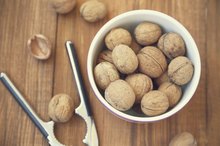List of Nuts & Seeds You Should Buy Organically
Although many people avoid nuts and seeds because they perceive them as being loaded with fat, they are a vital part of a healthy diet according to Dr. Edward Group, contributor to the Global Healing Center. Both nuts and seeds provide protein, vitamins and minerals. Many types of nuts and seeds also offer essential fatty acids, which are necessary for the maintenance of healthy skin and other body functions.
Always buy organic nuts and seeds and choose raw products instead of roasted seeds and nuts whenever possible -- organic products contain fewer pesticides, so they introduce fewer toxins into the body. Non-organic macadamia nuts, cashews and walnuts tend to contain particularly harmful pesticides according to the Grinning Planet website, so you should always buy these nuts organically.
Almonds
According to Dr. Group, almonds are rich in magnesium; a handful of organic almonds provides about 25 percent of your daily requirement of this mineral. Almonds are also rich in calcium, vitamin E and selenium. The fiber in organic almonds may help lower the risk of colon cancer and may help reduce cholesterol levels in the bloodstream.
Pumpkin Seeds
Does Flaxseed Contain Soluble or Insoluble Fiber?
Learn More
Organic pumpkin seeds provide plenty of essential fatty acids according to the Veg Health Guide website. They also contain a wide range of vitamins and minerals, such as potassium, magnesium, zinc, iron and vitamin K. Pumpkin seeds are thought to promote prostate health and strengthen bones in men. They may also have anti-inflammatory properties that could help people with arthritis.
Walnuts
Walnuts are loaded with an antioxidant called ellagic acid, which may help fight free radicals and reduce the risk of certain types of cancer. They also contain 16 different polyphenols, which are chemical groups that help ward off disease. Some researchers also believe that the consumption of walnuts can help improve brain function notes Dr. Group.
Sesame Seeds
How Much EPA & DHA Are in Chia Seeds?
Learn More
Organic sesame seeds are rich in copper and manganese, as well as phosphorus, iron, calcium and magnesium according to the Veg Health Guide website. They also contain plenty of dietary fiber, as well as unsaturated fats, which may help lower cholesterol levels. Sesame seeds contain antioxidants, called lignans, which are anti-carcinogens. The Veg Health Guide recommends grinding the sesame seeds before consumption to maximize the absorption of nutrients.
- Organic sesame seeds are rich in copper and manganese, as well as phosphorus, iron, calcium and magnesium according to the Veg Health Guide website.
- They also contain plenty of dietary fiber, as well as unsaturated fats, which may help lower cholesterol levels.
Other Nuts and Seeds
There are a variety of other nuts and seeds that you can buy organically. Pecans, cedar nuts, Brazil nuts, sunflower seeds and flaxseeds are all good choices. These foods can help you easily add vitamins, minerals, unsaturated fats, dietary fiber and essential fatty acids to your diet to promote optimal health.
Related Articles
References
- Global Healing Center: The Top 5 Healthiest Nuts
- Grinning Planet: The Benefits of Eating Nuts
- Cleveland Clinic. Fat and calories. Updated April 2019.
- Slavin J, Carlson J. Carbohydrates. Adv Nutr. 2014;(5)6:760-1. doi:10.3945/an.114.006163
- US Department of Agriculture. FoodData Central.
- Liu AG, Ford NA, Hu FB, Zelman KM, Mozaffarian D, Kris-etherton PM. A healthy approach to dietary fats: understanding the science and taking action to reduce consumer confusion. Nutr J. 2017;(16)1:53. doi:10.1186/s12937-017-0271-4
- Hever J, Cronise RJ. Plant-based nutrition for healthcare professionals: implementing diet as a primary modality in the prevention and treatment of chronic disease. J Geriatr Cardiol. 2017;(14)5:355-368. doi:10.11909/j.issn.1671-5411.2017.05.012
- Gupta RK, Gangoliya SS, Singh NK. Reduction of phytic acid and enhancement of bioavailable micronutrients in food grains. J Food Sci Technol. 2015;(52)2:676-84. doi:10.1007/s13197-013-0978-y
- Wang TY, Liu M, Portincasa P, Wang DQ. New insights into the molecular mechanism of intestinal fatty acid absorption. Eur J Clin Invest. 2013;(43)11:1203-23. doi:10.1111/eci.12161
- US National Library of Medicine. Soluble vs. insoluble fiber. Updated June 2018.
- Academy of Nutrition and Dietetics. Gluten free diet: building the grocery list. November 2018.
- Harvard Medical School. Quick-start guide to nuts and seeds. September 2019.
- Zhivagui M, Ng AWT, Ardin M, et al. Experimental and pan-cancer genome analyses reveal widespread contribution of acrylamide exposure to carcinogenesis in humans. Genome Res. 2019;(29)4:521-531. doi:10.1101/gr.242453.118
- Iweala OI, Choudhary SK, Commins SP. Food Allergy. Curr Gastroenterol Rep. 2018;(20)5:17. doi:10.1007/s11894-018-0624-y
- American College of Allergy, Asthma, and Immunology (ACAAI). Newly Issued Clinical Guidelines from the NIAID Recommend the Early Peanut Introduction, Not Avoidance. Milwaukie, Wisconsin; press release issued January 5, 2017.
- Du Toit. G.; Roberts, G.; Sayer, P. et al. Randomized Trial of Peanut Consumption in Infants at Risk for Peanut Allergy. N Engl J Med. 2015; 372:803-13. DOI: 10.1056/NEJMoa1414850.
- McMacken M, Shah S. A plant-based diet for the prevention and treatment of type 2 diabetes. Journal of Geriatric Cardiology : JGC. 2017;14(5):342-354. DOI: 10.11909/j.issn.1671-5411.2017.05.009.
- Tuso PJ, Ismail MH, Ha BP, Bartolotto C. Nutritional update for physicians: plant-based diets. Perm J. 2013;17(2):61-6. DOI: 10.7812/TPP/12-085.
- Wright, N., Wilson, L., Smith, M., Duncan, B., & McHugh, P. (2017). The BROAD study: A randomised controlled trial using a whole food plant-based diet in the community for obesity, ischaemic heart disease or diabetes. Nutrition & Diabetes, 7(3), e256–e256. DOI: 10.1038/nutd.2017.3.
- Preedy, V.; Watson, R.; and Patel, V. (2011) Nuts and Seeds in Health and Disease Prevention (1st Edition). New York: Academic Press. ISBN: 9780123756886.
Writer Bio
Owen Pearson is a freelance writer who began writing professionally in 2001, focusing on nutritional and health topics. After selling abstract art online for five years, Pearson published a nonfiction book detailing the process of building a successful online art business. Pearson obtained a bachelor's degree in art from the University of Rio Grande in 1997.









